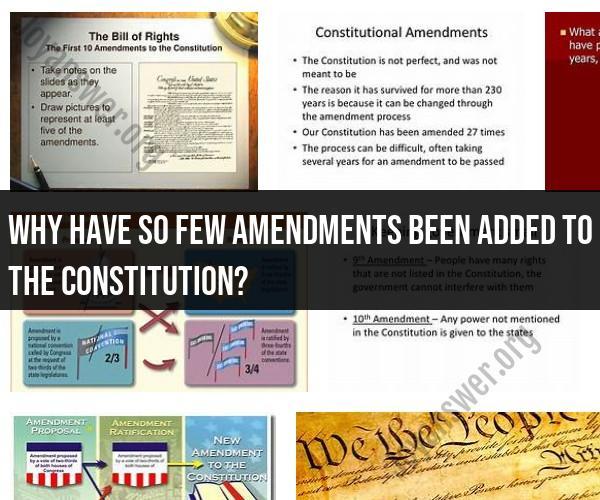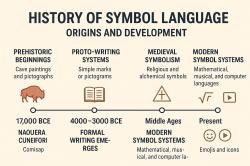Why have so few amendments been added to the Constitution?
The United States Constitution has been amended relatively infrequently compared to the number of proposed amendments. Several factors contribute to the limited number of amendments:
High Threshold: The process for amending the Constitution is intentionally difficult. To propose an amendment, it requires a two-thirds majority vote in both the House of Representatives and the Senate or a constitutional convention called for by two-thirds of state legislatures. To ratify an amendment, it needs approval by three-fourths (38 out of 50) of the state legislatures or by conventions in the states.
Stability and Continuity: The Constitution is seen as the foundational document that establishes the structure of the federal government and guarantees fundamental rights. As such, there's a strong tradition of respecting its stability and continuity. Many believe that making frequent changes to the Constitution could undermine its authority and create uncertainty in the legal system.
Checks and Balances: The U.S. Constitution is designed to provide a system of checks and balances among the three branches of government: legislative, executive, and judicial. This system often encourages the resolution of disputes and the enactment of laws through legislation rather than through constitutional amendments.
Political Consensus: To pass a constitutional amendment, there must typically be broad political consensus and support across the country. This can be challenging to achieve, as the diverse interests and perspectives of different states and political parties can make it difficult to agree on significant changes.
Alternative Mechanisms: Many issues and policies can be addressed through federal and state legislation, court decisions, and executive orders without the need for a constitutional amendment. These alternative mechanisms allow for flexibility and responsiveness to changing circumstances.
Separation of Powers: The framers of the Constitution intended it to be a foundational document that outlines the structure of government, the distribution of powers, and fundamental rights. They believed that issues not addressed in the Constitution should be left to the democratic process and the states rather than enshrined in the Constitution itself.
Political Obstacles: Amendments often face political obstacles, including partisan divisions and special interests that may oppose changes to the Constitution that could affect their influence or interests.
While the U.S. Constitution has been amended only 27 times, it remains a dynamic and adaptable document due to its flexibility and the interpretations provided by the judicial branch. Many important legal and societal changes have been addressed through court decisions and legislative actions rather than formal amendments. The limited number of amendments reflects a deliberate and cautious approach to altering the fundamental framework of the U.S. government.
Reasons for Infrequent Constitutional Amendments in U.S. History
There are a number of reasons why constitutional amendments in U.S. history have been infrequent.
- The Constitution is a difficult document to amend. It requires a two-thirds majority vote in both the House of Representatives and the Senate, as well as the ratification of three-fourths of the state legislatures. This is a high bar to meet, and it makes it difficult to amend the Constitution even when there is broad public support for change.
- The Constitution is a deeply cherished document. Many Americans view the Constitution as a sacred text, and they are reluctant to make changes to it. This is especially true when the proposed changes are controversial.
- The Constitution is a complex document. It can be difficult to understand the full implications of a proposed amendment, and there is always the risk that unintended consequences could result.
The Challenging Constitutional Amendment Process
The process of amending the Constitution is challenging and complex. It requires the following steps:
- A proposed amendment must be introduced in either the House of Representatives or the Senate.
- The proposed amendment must be passed by a two-thirds majority vote in both the House and the Senate.
- The proposed amendment must be ratified by three-fourths of the state legislatures.
If the proposed amendment passes all of these steps, it becomes part of the Constitution.
Significant Amendments and Changes to the U.S. Constitution
Despite the challenges of amending the Constitution, there have been a number of significant amendments over the years. Some of the most notable amendments include:
- The Bill of Rights (1791): The first ten amendments to the Constitution, the Bill of Rights, protect individual liberties such as freedom of speech, religion, and assembly.
- Thirteenth Amendment (1865): The Thirteenth Amendment abolished slavery.
- Fourteenth Amendment (1868): The Fourteenth Amendment granted citizenship to all people born or naturalized in the United States, and it guaranteed equal protection under the law to all citizens.
- Fifteenth Amendment (1870): The Fifteenth Amendment prohibited the denial of the right to vote on the basis of race, color, or previous condition of servitude.
- Nineteenth Amendment (1920): The Nineteenth Amendment granted women the right to vote.
- Twenty-sixth Amendment (1971): The Twenty-sixth Amendment lowered the voting age from 21 to 18.
These are just a few of the many amendments that have been made to the Constitution over the years. The Constitution is a living document, and it continues to evolve to meet the changing needs of the American people.
It is important to note that the difficulty of amending the Constitution is a feature, not a bug. The Founding Fathers designed the Constitution to be difficult to amend so that it would not be changed lightly. They wanted to ensure that the Constitution would be a stable and enduring document that would protect the rights of all Americans.













